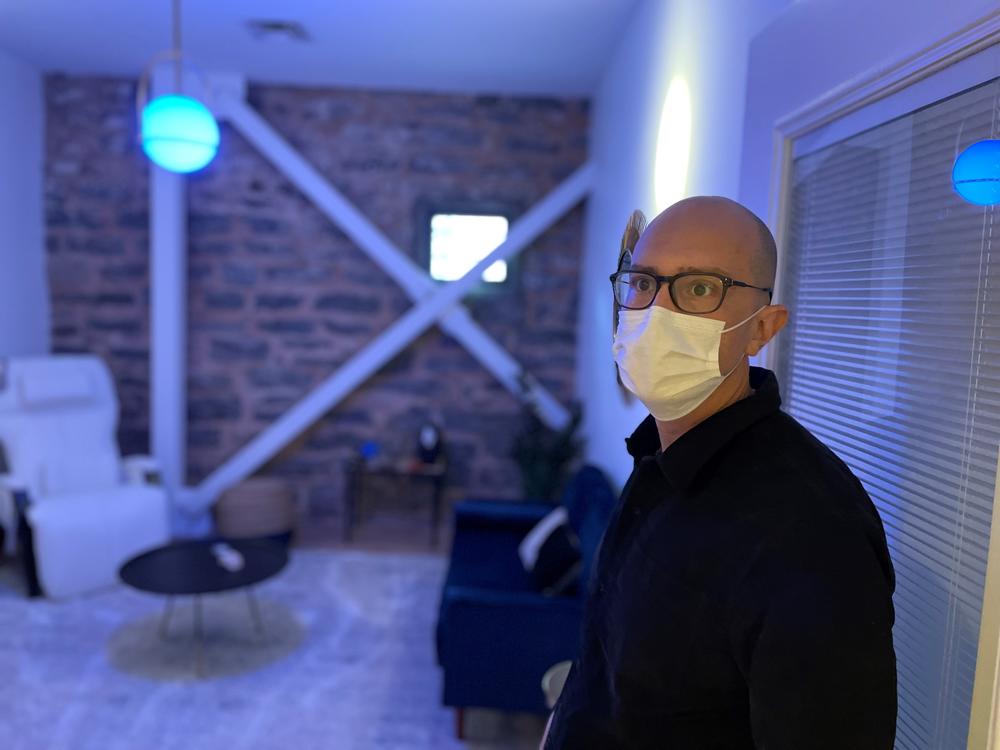
Caption
A room at the Atlanta Field Trip clinic designed for patients to process a ketamine treatment.
Credit: Ellen Eldridge / GPB News
Ketamine is an approved surgical anesthetic that can have mind-altering effects. The psychedelic has also been used illegally at dance clubs and raves. But growing evidence suggests a healing benefit for those whose depression has not been helped by traditional antidepressants. As GPB’s Ellen Eldridge reports, ketamine for depression is becoming more widely available in Georgia.

A room at the Atlanta Field Trip clinic designed for patients to process a ketamine treatment.
Some people are finding relief from depression with ketamine, which is approved by the Food and Drug Administration as a surgical anesthetic.
Jason G., who asked GPB News not to use his full name, is a 46-year-old Atlantan who described his first ketamine experience as eye-opening.
“At one point I realized I was in this dark box,” he said. “And as the light was coming to my eyes, I could see there were all these tiny little threads, almost like spider webs attached to my body from somewhere out in space. They're all attached all over me.”
He felt like a puppet being pulled by the strands.
The spider webs represented all the different stresses, the responsibilities, the negative thoughts, and the pressures that pulled him in different directions.
Jason said, “I remember a voice in my head asking me, ‘Are you ready to let go?’
“Yes,” he said.
That’s when the web released him.
“All of those threads snapped in the exact same moment, and I felt this just release this tremendous sense of relief, this overwhelming positive sensation,” Jason said.
The ketamine trip was something Jason said he would never forget. His experience taught him to reframe the way he perceives stress.
Ketamine, while in the class of psychedelics, does not always produce hallucinations. The mind-altering drug has been used off-label for years with patients who have treatment-resistant depression and post-traumatic stress disorder.
Reactions include intense changes in mood, perception, thinking, body awareness, and self-control that some patients find terrifying, whereas others do not.

Dr. Michael Muench stands in a room lit with blue light in the Atlanta Field Trip clinic.
Dr. Michael Muench leads the Atlanta Field Trip Health clinic where both Jason and his husband found relief.
The Toronto-based psychedelic therapy company opened here in 2021, after opening other clinics in Toronto, New York, Los Angeles and Chicago in 2020.
As a psychiatrist, Muench handles the medical part of the ketamine trip. He monitors the session and checks vital signs like heart rate, breathing and pulse.
A therapist is there to help ease patients into the experience, but Muench said that by about three to five minutes in, patients do not communicate as in a typical talk therapy session.
“Almost all people are not speaking, and outwardly it's very unremarkable,” Muench said. “Someone would be just lying there quietly, not speaking, with an eye shade and noise canceling headphones on.”
But the benefit of ketamine continues even after the drug wears off.
“The psychedelic path of healing is mediated not through the pharmacology, but through the vision, the understanding, the experience,” Muench said. “A good way to describe that is if you see something, you don't unsee it.”
After traditional cognitive behavioral therapy and psychotropic medications like Prozac and Zoloft failed, Jason said ketamine helped him focus on the root causes of his anxiety and depression.
“I remember my therapist walking me through exercises like, ‘After you have a negative thought, I want you to flash a red stop sign in your mind and then stop and rationalize with yourself why that thought is not realistic.’ Well, if I had to do that for every negative thought that comes into my mind, I'm not going to have time to get anything else done in my day,” Jason said.
Nydia Guity, a therapist with Atlanta Field Trip, said she reminds people that feelings of discomfort are not inherently bad.

Nydia Guity is a therapist with Atlanta Field Trip Health.
When patients emerge from a ketamine trip, Guity lets them sit and process their experience for a while.
“You feel depressed for a reason; you feel anxious for a reason,” Guity said. “So, when we actively honor those emotions, we work with them and not necessarily against them or resist them or act like they're not there.”
Over time, these emotions aren't as intense or as frequent, she said.
“That's progress,” Guity said. “Not masking that is not there.”
Depression is an extremely individual situation that doesn’t necessarily stem from one cause, Muench said.
“Because of the development of selective serotonin reuptake inhibitors (SSRI drugs) in the 1980s, we've also come to associate [depression] highly with serotonin levels,” he said. “And the reality is the depression is actually different things for different people, and so an example someone might discover, for instance, that their treatment-resistant depression is actually very woven in and intimately related to a particular trauma.”
The Schedule III non-narcotic substance has been available to licensed prescribers since the ‘70s. Since then, multiple studies have shown ketamine helps some depression patients who feel like they’ve tried everything else.
But patients can only receive ketamine injections under the supervision of a psychiatrist. That’s because its therapeutic benefits might decline with overuse, and the drug has a potential for misuse as it has been in dance clubs and rave parties.
Dr. Boadie Dunlop, the director of the Mood and Anxiety Disorders Program at Emory University, said ketamine works differently than medications that target the neurotransmitter serotonin.
Ketamine acts upon glutamate systems in the brain, which seem to be disrupted in many people with depression.
“There was an alignment there between an understanding of ketamine's mechanism of action, and an understanding of what — or a partial understanding — of what is going wrong in the brain when people have depression,” Dunlop said.
Dunlop said much is still unknown about the underlying disease process that causes depression, but he compared it to any other physical injury, like a broken arm.
Antidepressants are like a cast for the broken arm, protecting it as it heals, he said.
But sometimes the bone is so shattered it needs surgery.
That’s where Dunlop said ketamine comes in, like a surgical pin holding those fragments together.
And ketamine works much faster than pills that need time to build up in the body.
“Ketamine can lift them from depression to a state of remission in a relatively short period of time of two to four weeks,” Dunlop said. “And that's a significant percentage of patients improving that way.”
Studies suggest about half of people who seek out ketamine therapy for depression find some relief.
Last October, the National Institutes of Health awarded the first grant in 50 years for research on therapeutic effects of the classic psychedelic, psilocybin, which is commonly known as "magic mushrooms," on depression.
A new trial will begin recruiting this fall at Emory University, studying the effects of psilocybin on cancer survivors who are demoralized, Dunlop said.
Those are people who have really come to lose their motivation and purpose in life, he said, feeling really like they've lost their way and how to go forward after receiving a cancer diagnosis and treatment.